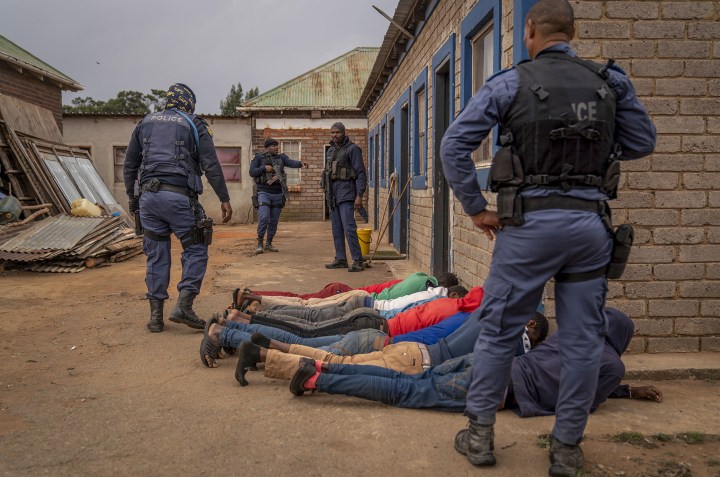ISS TODAY ANALYSIS
Massacres and atrocities in SA on increase while smaller-scale instances of violence often ignored

Large-scale attacks provoke outrage, but so should the daily devastation wreaked by murder, rape and brutality in South Africa.
A month ago, 16 people died when more than 130 bullets were fired at the Mdlalose Tavern in Nomzamo Park informal settlement in Soweto, Johannesburg. Two weeks ago, eight women were raped, some of them several times, allegedly by nearly 20 illegal miners who attacked a group filming a music video outside West Village, west of Johannesburg.
And in six days, on 16 August, we will be marking the 10th anniversary of the Marikana Massacre, in which South African Police Service (SAPS) members shot dead 34 striking mineworkers and seriously injured many others.
The attacks at both the Mdlalose Tavern and Marikana involved the use of automatic weapons. These account for the extremely high death tolls in episodes of violence that took place over a relatively short time. Meanwhile, the large number of perpetrators and the long time period over which the assault took place — and its isolated location — account for the high number of rapes committed in West Village.
The scale of the killings and rapes in these three incidents resulted in them receiving a high level of media attention. Episodes of murder and rape of this magnitude are unusual. But attacks in which multiple people are murdered, and incidents of rape where there’s more than one victim or perpetrator, aren’t.
Over the three years between 2017/18 and 2019/20, the police recorded 314 incidents where three or more people were killed in a single attack. In 35 of these cases, five or more people lost their lives.
Multiple perpetrator rape incidents are more common than multiple victim rapes. In a study of rapes committed in South Africa in 2012, one in six (16.7%) involved more than one perpetrator, while one in 14 (7%) involved more than one victim.
Marikana stands out as a police massacre. But the Mdlalose Tavern killings and West Village rapes form part of the overall problem of South Africa’s exceptionally high rates of murder, gender-based violence, robbery and violent conflict.
Most incidents of multiple killings or rape, whether by civilians or police, pass largely unnoticed. However, the scale of violence in these episodes has not only drawn intense media and public attention, but provoked other reactions. The West Village incident led to attacks by community members on informal miners around the Krugersdorp area. Because some miners come from neighbouring countries, it has also incited a further wave of anti-foreigner mobilisation.
The public focus on these incidents reflects a broader pattern. Large-scale killings, sometimes labelled as massacres, are often regarded as particularly worthy of attention and become the focus of community action and commemoration. Sometimes though, it is incidents of violence involving a single victim that provoke the highest levels of outrage and that are memorialised.
The rape case that has probably provoked the most public outrage in South Africa was the rape and murder of 19-year-old university student Uyinene Mrwetyana in Cape Town in 2019. As with Marikana, in subsequent years, events have been held to remember her death.
Efforts to memorialise some attacks, obtain redress for the victims or their families, and accountability for the perpetrators, occur against a backdrop in which tens of thousands of people are violently victimised each year.
With the police being able to solve only 15% of murders in the 2020-21 year, a vast majority of victims’ families are left without any prospect of redress or accountability. The situation regarding the almost 53,000 cases of sexual offences is even worse. Studies of rape case attrition in the criminal justice system, such as that on rapes committed in 2012, found that between 6% and 7% of cases reported to the police resulted in a guilty verdict.
It is appropriate that we be horrified and outraged by these mass attacks. However, in principle, the fact that a person died in a large-scale killing, or was raped along with many others, does not make their death or rape more worthy of attention than other victims. It is not just these large-scale incidents that should provoke our horror, but the continual destruction wreaked by murder, rape and other brutality on people in this country.
If there is an overall cause that the memory of these gross acts of violence should inspire, it is a vision of South Africa that is not only free from massacres and mass rape, but generally free of violence. DM
David Bruce, Independent Researcher and Institute for Security Studies (ISS) Consultant.
Research for this article was funded by the Hanns Seidel Foundation.
First published by ISS Today.





















 Become an Insider
Become an Insider
Completely agree.
Each and every gratuitous attack must be dealt with as a serious crime that it is.
And am wondering, that if every infringement was dealt with as prescribed by the law, we would perhaps be in a totally different paradigm.
The “no broken windows” approach.
There is no need for new campaigns, the police just need to stick to the basics of law enforcement. The laws are all there. Apply them.
Just driving to the CTIAirport on the N2 from Somerset West last weekend at 7pm, I was horrified. Every third, sometimes every second vehicle on the highway was a serious risk.
No headlights, no rear lights, no indicating and crossing from right most lane to an off ramp, crabbing wheels, cars hobbling along at 60klm/hr, trucks limited to 80klm/hr in the right most lane, people crossing.
If law enforcement would pull off every vehicle not complying with law; if willful destruction of property, and every mugging, rape and murder was treated as prescribed, we might see a change. What are the police doing?! Just flood the streets and communities and be present, and nab wrong doers.